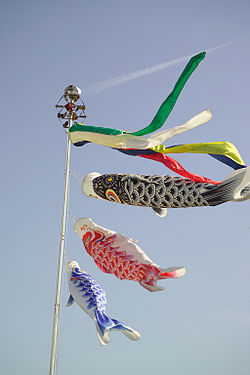こどもの日
Jump to navigation
Jump to search
Japanese
[edit]
Etymology
[edit]Compound of 子供 (kodomo, “child, children”) + の (no, “possessive particle”) + 日 (hi, “day”).[1]
Pronunciation
[edit]Proper noun
[edit]こどもの日 • (Kodomo no Hi)
- Children's Day, a festival held in Japan on 5 May to celebrate children; part of the Golden Week series of holidays in May
See also
[edit]- List of festivals in Japan on Wiktionary
- List of festivals in Japan on Wikipedia
